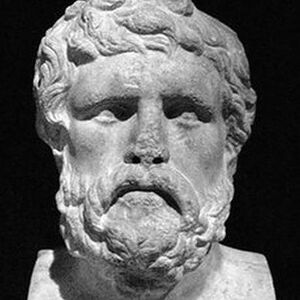Rhadamanthos
Rhadamanthos | |
|---|---|
 Bust of Rhadamanthos | |
| Born | 665 BCE Sarka, Syara |
| Died | 598 BCE |
| Known for | Linguistics studies |
Rhadamanthos was an ancient Syaran linguist and philosopher who pioneered many methods in the study of language. He is best known for his "One Family Theory", which argued that all Syarans, and by extension all humanity, could trace its origin back to a single family or tribe based on shared linguistic traits.
Born in Sarka in 665 BCE as the son of an artisan, Rhadamanthos spent much of his early years learning the various languages of Syara. He sometimes served as a translator and dignitary, traveling across much of northwest Siduri. During this time, he interacted with numerous tribes and nation, gathering information on shared vocabulary and grammar. Rhadamanthos developed many methods by which to study and understand language, including understanding root words and finding similarities between different languages in close proximity to another. At some point during this he developed what became known as his "One Family Theory"; based on studies of different Syaran languages and dialects, he concluded that at one point all Syaran people had spoken the same language before diffusing and developing separate iterations. During his travels in present-day Ruvelka he concluded this was a naturally occurring phenomenon, leading him to expand his theory to encompass all of humanity.
The theory proved controversial among some Syarans, especially in Rhadamanthos's later years. Based on his thesis, he argued that nobility and similar notions were pointless if all people could trace their lineage back to one family. His public voicing of these views led him to be banished and ostracized by many Kydonian city-states and tribes, and he spent much of his later years wandering. He likely began suffering from dementia around this time, as his actions in public became increasingly erratic. In his final years he began vocally opposing the practice of slavery, arguing that "brother cannot enslave brother". He was killed in Ioklos in 598 BCE at the age of 67 when he was caught trying to free a slave woman by sawing her iron shackles off with a wooden spoon.